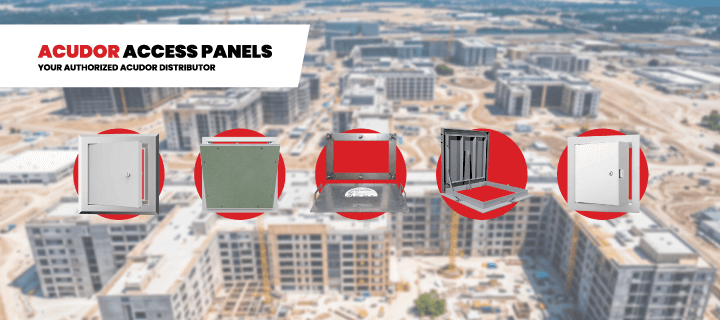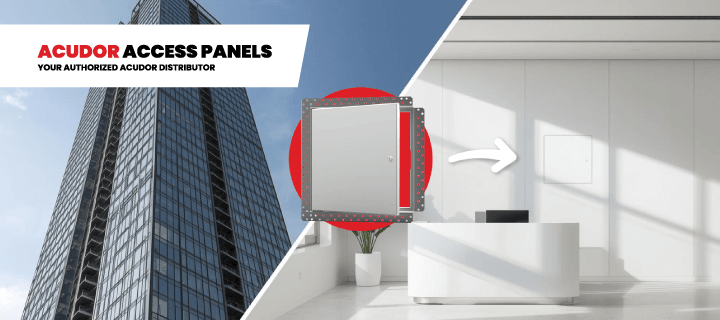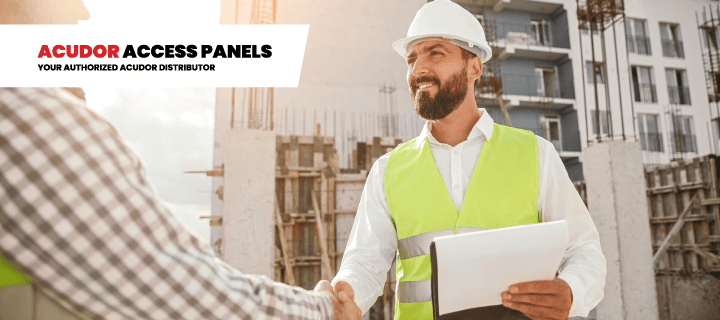How To Select Access Panels That Meet Federal & Public Infrastructure Standards Posted by Acudor Access Panels on 29th Sep 2025
When selecting access panels for federal and public projects, contractors must check for fire-rating compliance, material durability, sound ratings, security, and accessibility regulations.
Violating standards or codes can lead to costly delays, failed inspections, and legal fines.
Compliance can be intimidating, especially if you want to get everything right the first time. With government projects, the rules can get even more stringent.
This blog post explains which standards to look out for and how to select access panels that simplify compliance with public infrastructure standards.
What Standards Must Access Panels Meet in Federal or Public Projects?
In federal or public projects, standards often include fire ratings, building codes, and accessibility guidelines (Americans with Disabilities Act or ADA). These projects focus on safety, durability, and long-term use, making compliance necessary for every component.
Fire Rating Standards
Access panels for public fire-rated assemblies must be certified to a specific fire-resistance rating.
Fire-rated access doors slow down the spread of flames and smoke through fire-rated walls and ceilings where they're installed. Thus, they preserve these assemblies for a set period instead of being a weak point in the event of a fire.
These ratings, often measured in minutes (e.g., 60, 90, 120 minutes), are set by organizations like NFPA, ASTM, and ULC. They are a crucial part of a building's passive fire performance system.
Building Codes
Building codes, such as the International Building Code (IBC), dictate all construction materials' structural and functional requirements.
For access panels, this means they must meet standards for structural integrity, durability, and safe installation.
Compliance with these codes ensures the panel can withstand heavy use without failing. This enables them to provide reliable maintenance access and still maintain the integrity of the surrounding wall or ceiling.
It also helps avoid inspection failures or the need for expensive and time-consuming rework.
ADA Accessibility Guidelines
In institutional construction, projects must be accessible to everyone. As such, access panels in public areas need to comply with the ADA. The requirements for this relate to:
- The force required to open the panel
- The panel's placement for easy access for people with disabilities
- Clear floor space around access panels
A compliant access panel is more than just a functional opening. It's an important part of a building's overall accessibility plan, ensuring safety and ease of use for all individuals.
Sound Ratings
Sound rating (STC) is another overlooked aspect, especially in school bond projects and hospitals. In schools, access panels in classroom walls shouldn't hurt the sound quality of the space, preventing noise from hallways or machine rooms.
Similarly, in hospitals, keeping a quiet environment is key for patients. Access panels with high STC ratings help the building's overall sound control.
Security Requirements
Security is also important in many federal and public buildings. This includes simple key locks or more complex tamper-proof designs or systems that work with the building's security network.
Access panels in sensitive areas may need special security features to protect valuable equipment or limit access. Careful planning is necessary to match the security needs of each part of the project.
Material Durability
Public infrastructure experiences a lot of wear and tear. Access panels should withstand constant use, cleaning, and potential impact without breaking.
This means choosing panels made from high-quality, corrosion-resistant materials built to last.
Need a panel that fits your exact specs? Explore our custom size options to ensure every detail matches your project requirements.
Related: How Can Code-Compliant Access Panels Help Commercial Projects Pass Inspection Without Delays?
Why Is Panel Selection Important for Institutional Project Approval?
Choosing compliant access doors directly lowers the chance of rework and inspection delays, ensuring the project meets all safety, design, and function codes. Compliant panels:
Ensure Project Compliance and Approval
Selecting the right access panels for institutional projects impacts project approval. These projects, often funded by taxpayers, face intense scrutiny from multiple oversight bodies.
Such bodies include regulatory agencies and architectural review boards. To get approval, every component, including access panels, must meet or exceed strict performance and aesthetic standards.
Choosing certified, compliant panels from the beginning provides the necessary documentation and proof, ensuring a smoother and faster approval process.
Avoid Costly Delays and Rework
Non-compliant access panels can be a major source of project delays. If an inspector finds that a panel doesn't meet fire-rating requirements, it can lead to failed inspections or costly stop-work orders.
Such scenarios force contractors to remove and replace the non-compliant panels, which:
- Adds material and labor costs
- Extends the project timeline
- Potentially leads to financial penalties
By selecting certified, spec-compliant doors from the start, you eliminate the risk of these setbacks.
Maintain Aesthetic and Functional Integrity
Beyond code compliance, a project's visual appeal is a key factor in institutional settings. Bulky access panels can detract from the overall aesthetic of a building. Outlook is particularly important in public spaces like school hallways or hospital lobbies.
Recessed doors and federal project access panels that can be finished to match the surrounding drywall offer a seamless, concealed look. This ensures that the access point provides essential functions without compromising design.
Ready to simplify compliance and avoid rework? Request a quote and get expert recommendations tailored to your project.
Related: School Construction Trends 2025: 5 Must-Know Access Panel Innovations
How Does the FWC-5015 Support Drywall Fire-Rating Compliance?
The FWC-5015 Fire-Rated Recessed Access Door For Drywall Ceiling helps with commercial compliance because:
- It has a 90-minute fire-resistance rating for drywall ceilings, tested for CAN ULC S101-14, ASTM E119-16 and NFPA 251.
- It’s recessed to be fitted with 5/8" fire-rated drywall for a seamless finish.
- The self-closing and self-latching door mechanisms are consistent with fire-performance requirements.
- Its perforated frame ensures easy installation.
- The concealed hinge and self-centering device enable a seamless, professional appearance.
- It has a zinc-coated steel finish that provides superior corrosion resistance and durability in demanding environments.
Related: 5 Questions Answered About Acudor's Fire-Rated Access Doors
Frequently Asked Questions About Public Projects
1. What Fire-Rating Requirements Do Access Panels Need for Federal or Public Projects?
Access panels used in federal and public infrastructure projects must meet strict fire-resistance standards, often certified by NFPA, ASTM, or ULC. Ratings are typically measured in minutes (e.g., 60, 90, or 120) to ensure panels help contain flames and smoke.
2. Why Do Building Inspectors Reject Non-Compliant Access Panels?
Building inspectors may reject panels that fail to meet IBC codes, fire-rating certifications, or accessibility requirements. Non-compliance can trigger costly stop-work orders, rework, and project delays. Choosing certified, code-compliant access panels upfront prevents these risks.
3. What Materials Are Best for Durable Access Panels in Public Infrastructure?
Public infrastructure projects require panels built from corrosion-resistant, high-strength materials such as zinc-coated or stainless steel. These materials withstand heavy use, frequent cleaning, and impact without constant repairs or replacements.
4. How Can I Tell If an Access Panel Is ADA Compliant?
When reviewing specs, check whether the panel's design supports ADA accessibility guidelines, such as easy-to-open latches, low operating force, correct mounting height for wall panels, and adequate clearance.
Conclusion
Picking public infrastructure panel specs needs a full approach. It's not just about meeting one rule but understanding and handling all the relevant codes and functional needs.
From fire, sound, and accessibility compliance to material durability, checking all the boxes with access panels can be overwhelming. Choosing already compliant access panels helps remove this headache.
Our panels are built for federal and public projects, ranging from fire-rated to ADA-compliant access solutions. Check out our access solutions or contact us to discuss your access panel compliance needs. Call us at +1-888-617-4472 if you run into any difficulty picking access solutions.
Acudor Access Panels is a trusted and authorized distributor of Acudor products. We proudly bring you their full range of industry-leading access doors and panels.





